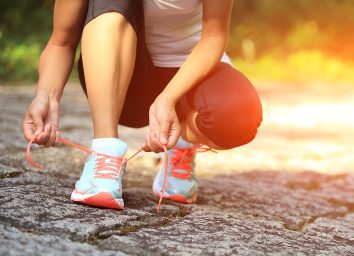What Going for a 1-Mile Run Does to Your Body, Says Science

It's no surprise that exercise is good for you. But when we say "good for you," what exactly do we mean? From speeding up your heart rate to lowering your stress to improving your sleep, even a modest exercise—like, say, a single one-mile run—can lead to a range of health benefits that make it worth incorporating into your daily routine. But don't listen to me. Listen to the science: Numerous studies and researchers have examined the various health effects of running a mile and have noted a wide range of positive side effects, many of which will surprise you. Read on for more, and for more on the science of running, don't miss the Side Effects of Running Every Day, According to Science.
Your cholesterol levels improve.

"Moderate-intensity exercise like running one mile per day is associated with increases in HDL ('good') cholesterol," says Michelle Darian, MS, MPH, RD, a nutrition scientist at InsideTracker. "HDL cholesterol is one of the most significant markers of heart health; its job is to remove bad cholesterol from the bloodstream, keeping your heart's arteries in their best shape."
She points to a 2014 research review in the journal Sports Medicine, which confirmed "the beneficial effects of regular activity on cholesterol levels." What's more, a 2013 study found that those who ran regularly had a 36% lower risk of hypercholesterolemia (aka high cholesterol) compared to those who walked. A study in Medicine & Science in Sports & Exercise found that aerobic exercise, such as running, increased HDL by 4.6% while reducing LDL by 5%.
Your resting heart rate drops.

Aerobic exercise, including running, is associated with a decrease in resting heart rate (RHR). For example, a 2018 meta-analysis published in the Journal of Clinical Medicine found that exercise, including running, helped to decrease RHR. "Optimizing your RHR is vital because it means your heart is working efficiently to circulate blood to the rest of your body. A lower RHR is associated with a longer lifespan," explains Darian. And for some news from the front lines of scientific research, see here for the One Major Side Effect of Sitting on the Couch Too Much, Says New Study.
Your muscles get stronger.

Running is generally put in the category of "cardio exercise" and not widely regarded as a muscle builder. But plenty of research has shown that a run can build lower body muscles, particularly if it's for short, intense periods. A study of college students found that those doing four sets of four-minute sprints, followed by three minutes of rest over several weeks experienced an 11% increase in their quadriceps muscles at the front of the thigh.
"Blood flow to the muscles is increased. Changes inside the muscle cells provide more energy for the muscles," explains Dr. Shelley Armstrong, program director for Walden University's College of Health Professions undergraduate programs. "The muscles become better at conserving glycogen and metabolizing fat for energy. Having a stronger muscular system results in less injuries."
Your stress drops.

Anyone who has gone for a brief run after a few days of inactivity has probably experienced this firsthand. Regular runs can have a wide range of benefits on one's mental health, including reducing depression, anxiety, and mental stress—all while enhancing physiological well-being. "Since 1980, numerous nationwide studies and literature reviews have concluded that exercise is associated with reduced depression," says Armstrong. "One of the most widely reported psychological benefits of acute exercise is a reduction in anxiety, an effect that can be felt several hours after running the mile."
According to a 2011 study published in the journal Psychology of Sport and Exercise, running or jogging for just 10 minutes on a grassy field significantly improved mood compared to completing a cognitive task for 10 minutes. A review of dozens of scientific trials found that "exercise is moderately more effective than a control intervention for reducing symptoms of depression."
"While running is sometimes linked to short-term cortisol spikes, a 2019 study revealed that simply being outside can actually decrease your cortisol at a rate of over 21 percent per hour," adds Tricia Pingel, NMD, an Arizona-based naturopathic physician.
You sleep better.

"We have solid evidence that exercise does, in fact, help you fall asleep more quickly and improves sleep quality," according to Charlene Gamaldo, M.D., medical director of Johns Hopkins Center for Sleep at Howard County General Hospital.
She points out that moderate aerobic exercise has been shown to increase the amount of deep sleep an individual experiences, and helps to "stabilize your mood and decompress your mind," allowing for more restful sleep. This is true of those who take part in moderate amounts of exercise—Gamaldo says just 30 minutes of aerobic exercise may be needed to see benefits at bedtime.
"Running can help improve your sleep by increasing your endorphins during the day, allowing for calmer, more restful sleep at night," adds Pingel.
She points to a 2014 study that found running for 20 minutes a day improved sleep quality and decreased the amount of time people spent awake after they initially fell asleep.
Your joints improve.

This one might also surprise you, especially if you've heard that running can be tough on your knees. But according to Todd Buckingham, exercise physiologist at the Mary Free Bed Sports Rehabilitation Performance Lab, the assertion that running is bad for your joints "is a complete myth. In fact, runners have healthier knees than non-runners," he says.
In a large 2018 study published in the Journal of Bone & Joint Surgery, researchers found that only 8.8% of runners had arthritis in their knees compared to 17.9% of non-runners. Two years before, the European Journal of Applied Physiology published findings that running appears to improve the biochemical environment of the knees, decreasing the protein (cytokine) that causes inflammation that has been connected to degenerative joint disease.
"Injuries tend to occur when runners try to increase their mileage too much, too soon. So, you must be smart about your running," adds Buckingham. "But this means you can lace up your shoes with confidence knowing that you are not doing damage to your knees when you head out for your daily run."
Your risk of cardiovascular disease drops.

Running a mile can provide a number of long-term health benefits, as well. Cardiovascular disease is the leading cause of death for men and women in the United States. But physical activity, including running, has been shown to decrease the risk of heart disease significantly, even if done for modest amounts of time or intensity. Research published in 2014 in the Journal of the American College of Cardiology found that compared with non-runners, runners had a 45% lower risk of cardiovascular mortality and "running, even 5-10 minutes per day and slow speeds <6 mph, is associated with markedly reduced risks of death from all causes and cardiovascular disease," as the authors put it.
Research published earlier this year in PLOS Medicine offers further support that a daily run, even a short one, can offer big health benefits. Drawing on data gathered from accelerometers worn by more than 90,000 participants, the researchers found that those who were most active enjoyed an average reduction in risk of cardiovascular disease of 48% to 57%. And if you prefer to walk your way to better health, make sure you're aware of The Single Worst Shoes for Walking Every Day, According to a New Study.








